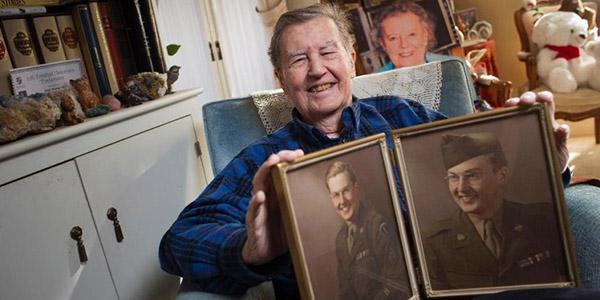A Founding Father of the CIA Served His Nation for More Than Six Decades
SIGNAL Magazine honors the service of longtime intelligence officer and diplomat Hugh Montgomery, who died April 6 at age 93.
Editor’s note: Hugh Montgomery, a legendary longtime officer in the intelligence community and a diplomat, died April 6. Just two weeks ago, he gave an interview to SIGNAL Magazine comparing global threats decades ago and now. We would like to honor his service in the cause of freedom by publishing this excerpt from that article about his experiences over the years. The complete article will appear in the May issue of SIGNAL.
Former ambassador Hugh Montgomery enlisted in the Army at age 18 and was wounded while serving as a paratrooper—he jumped into Normandy on D-Day with the 82nd Airborne. He subsequently joined the Office of Strategic Services (OSS), the CIA’s predecessor. The office was established in 1942, when Franklin D. Roosevelt was president. Maj. Gen. William Donovan, considered the father of American centralized intelligence, led the organization. “Because of his very close relationship with President Roosevelt, he was able to do things with 13,000 people that we couldn’t do with 13 million these days,” Montgomery said.
In the weeks before he died, Montgomery recalled that Donovan, nicknamed “Wild Bill,” also enjoyed support from Gen. George Marshall, who served as Army chief of staff under Roosevelt and “who came to appreciate the intelligence products he was getting from the OSS analytical branch,” Montgomery said.
The OSS was a small but capable organization. “It was able to create all kinds of irregular warfare activities in Europe and the Middle East and everywhere else, but again, simply because Donovan had a blank check from President Roosevelt,” Montgomery reported.
When Roosevelt died in April 1945, Gen. Donovan sent a message to the OSS staff members saying the president’s death likely would mark the end of the organization because “I have more enemies in Washington than I do in all of Europe,” Montgomery recalled. President Harry S. Truman “didn’t waste very much time in, simply with an executive order, abolishing OSS. And that was the end of that,” he added.
OSS personnel scattered across government, but then, “Truman came to recognize in very short order that he needed an intelligence service, which led to the CIA,” Montgomery said. The CIA was created in 1947 when Truman signed the National Security Act into law.
Montgomery’s early days with the intelligence community involved moving behind enemy lines for a variety of missions, including the search for nuclear scientists. “We went in very small teams, and most or all of the team spoke fluent German. We had very carefully plotted and planned activities. They were just quick trips, normally using captured German vehicles and that sort of thing—sometimes successful, sometimes not,” he said.
Montgomery said he deliberately forgot the names of the scientists on their list because that is what intelligence operatives do. Most of those names, he added, would probably not be recognizable outside of nuclear science circles anyway. “To us, they were just names of scientists deep, deep inside Germany,” he said.
He also recalled helping a top-ranking German general escape from the former Czechoslovakia so that the officer could surrender to the United States rather than Russia. “We were able to get him in Prague during the last days of the confusion of the war and bring him out under a blanket in the back [seat] of a car to the demarcation line, which was west of Prague,” Montgomery reveals. “We brought him out, and he was turned over as a major war criminal and tried and inevitably hanged by the Czechs.”
Montgomery spoke multiple languages, including German, French, Spanish, Portuguese, Italian, Russian and Dutch, with “some Greek and a little Japanese here and there.” His mother was a language teacher, and he himself briefly taught Spanish and Portuguese at Harvard before being coaxed by friends to join the OSS and “earn an honest living back in Washington,” he recounted. Montgomery lost count of the number of countries he was assigned to during his career, but they included France, Germany, the former Czechoslovakia, Denmark, Russia, Italy and Greece, with some time spent in Holland as well.
As far as Montgomery knew, his life was never in real danger during the wartime missions. “I hope not. I never lingered long enough to find out. We believed in moving fast,” he said.



Comment
Ambassador Montgomery
Hi Mr. Seffers,
I recently read your wonderful article on Ambassador Montgomery. My father and mother met him the night he was bestowed the honor with the Donovan Award at the OSS Society's annual dinner and were smitten by his outstanding demeanor and character. My father, Helias Doundoulakis, was awarded the Distinguished Service Award that same night, along with my uncle George (posthumously) — that's how my parents met him. My mother at least saw my Dad receive the award that night. Ambassador Montgomery's wife did not.
Notwithstanding, he was a remarkable individual. It is sad that he has died, like so many others. My Dad also died soon after the Donovan Dinner, on Feb. 29th, 2016. In my long career as a neuroradiologist, I asked my WWII veteran patients to sign a book, with their names, rank, branch, and where they served. All those patients have died as well.
Thank you for accompanying the Ambassador on his journey home; many like him will be missed, and sadly, never to be replaced.
Sincerely,
Stephen Doundoulakis, MD
Comments